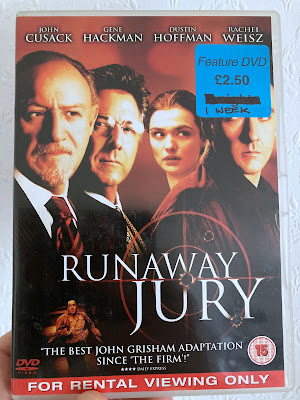Legal thriller adapted from a John Grisham novel.
The plot is a little tricky to explain, but here goes... Rankin Fitch (Gene Hackman) is a consultant who gets paid off to rig juries in court cases. Wendell Rohr (Dustin Hoffman) is a morally upstanding lawyer who believes in truth, justice, decency and so on. The two men are pitted against each other during a trial against a gun manufacturer following an office shooting. But one of the jurors (John Cusack) and his girlfriend (Rachel Weisz) appear to hold all the cards about the real outcome of the court ruling. And, inevitably, nothing is quite what it seems.
It ought to work, and it very nearly does, but you are deliberately left in the dark about Cusack and Weisz’s real motivations until about 10 minutes before the end. By the time everything suddenly makes sense, you feel a little cheated that the film did so little to guide you through the various twists of the plot. Plus, their relationship isn’t fully explored. When we first meet them they appear not to know each other, but then it transpires that they’ve known each other for years. So were they pretending to be strangers as part of the scam? If so, why, when they were merely talking in an empty candle shop and this had nothing to do with manipulating the court case? If there was an explanatory cue here, it wasn’t clear enough.
All four of the leads are good, if not exactly stretched in the acting department, but there’s still something missing. Plus, Hackman’s hi-tech centre of operations – a flashy surveillance crime hide-out that no one seems to know about – is almost as implausible as the elaborate dens of villains in the 1960s Batman TV series.







